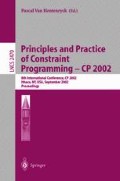Abstract
We systematically investigate the connections between constraint satisfaction problems, structures of bounded treewidth, and definability in logics with a finite number of variables. We first show that constraint satisfaction problems on inputs of treewidth less than k are definable using Datalog programs with at most k variables; this provides a new explanation for the tractability of these classes of problems. After this, we investigate constraint satisfaction on inputs that are homomorphically equivalent to structures of bounded treewidth. We show that these problems are solvable in polynomial time by establishing that they are actually definable in Datalog; moreover, we obtain a logical characterization of the property “being homomorphically equivalent to a structure of bounded treewidth” in terms of definability in finite-variable logics. Unfortunately, this expansion of the tractability landscape comes at a price, because we also show that, for each k ⩾ 2, determining whether a structure is homomorphically equivalent to a structure of treewidth less than k is an NP-complete problem. In contrast, it is well known that, for each k ⩾ 2, there is a polynomial-time algorithm for testing whether a given structure is of treewidth less than k. Finally, we obtain a logical characterization of the property “having bounded treewidth” that sheds light on the complexity-theoretic difference between this property and the property ‘being homomorphically equivalent to a structure of bounded treewidth”.
Supported in part by NSF grant IIS-9907419.
Supported in part by NSF grants CCR-9988322, IIS-9908435, IIS-9978135, and EIA-0086264, and by BSF grant 9800096.
Access this chapter
Tax calculation will be finalised at checkout
Purchases are for personal use only
Preview
Unable to display preview. Download preview PDF.
References
H. L. Bodlaender. A linear-time algorithm for finding tree-decompositions of small treewidth. In Proc. 25th ACM Symp. on Theory of Computing, pages 226–234, 1993.
A. K. Chandra and P. M. Merlin. Optimal implementation of conjunctive queries in relational databases. In Proc. 9th ACM Symp. on Theory of Computing, pages 77–90, 1977.
R. Dechter. From local to global consistency. Artificial Intelligence, 55(1):87–107, May 1992.
R. Dechter. Bucket elimination: a unifying framework for reasoning. Artificial Intelligence, 113(1–2):41–85, 1999.
R. G. Downey and M. R. Fellows. Parametrized Complexity. Springer-Verlag, 1999.
R. Dechter and J. Pearl. Tree clustering for constraint networks. Artificial Intelligence, pages 353–366, 1989.
E.C Freuder. Complexity of k-tree structured constraint satisfaction problems. In Proc. AAAI-90, pages 4–9, 1990.
T. Feder and M. Y. Vardi. The computational structure of monotone monadic SNP and constraint satisfaction: a study through Datalog and group theory. SIAM J. on Computing, 28:57–104, 1998.
M. R. Garey and D. S. Johnson. Computers and Intractability-A Guide to the Theory of NP-Completeness. W. H. Freeman and Co., 1979.
W. Gutjahr, E. Welzl, and G. Woeginger. Polynomial Graph Colorings. Discrete Appl. Math., 35:29–46, 1992.
P. Hell and J. Nešetřil. On the complexity of H-coloring. Journal of Combinatorial Theory, Series B, 48:92–110, 1990.
P. Hell and J. Nešetřil. The core of a graph. Discrete Math., 109:117–126, 1992.
P. Hell, J. Nesetril, and X. Zhu. Complexity of Tree Homomorphism. Discrete Appl. Math., 70:23–36, 1996.
J. N. Hooker. Constraint satisfaction methods for generating valid cuts. In Advances in computational and stochastic optimization, logic programming, and heuristic studies, pages 1–30. Kluwer, 1997.
N. Immerman. Relational queries computable in polynomial time. Information and Control, 68:86–104, 1986.
N. Immerman. Descriptive Complexity. Springer, 1999.
P. Jeavons. On the algebraic structure of combinatorial problems. Theoretical Computer Science, 200(1–2):185–204, 1998.
Ph. G. Kolaitis and M. Y. Vardi. On the expressive power of Datalog: tools and a case study. Journal of Computer and System Sciences, 51(1):110–134, August 1995.
Ph.G. Kolaitis and M. Y. Vardi. Conjunctive-query containment and constraint satisfaction. Journal of Computer and System Sciences, pages 302–332, 2000.
Ph.G. Kolaitis and M. Y. Vardi. A game-theoretic approach to constraint satisfaction. In Proc. of the 17th Nat. Conf. on Artificial Intelligence (A A AI 2000), pages 175–181, 2000.
T. J. Schaefer. The complexity of satisfiability problems. In Proc. 10th ACM Symp. on Theory of Computing, pages 216–226, 1978.
J. D. Ullman. Database and Knowledge-Base Systems, Volumes I and II. Computer Science Press, 1989.
M. Y. Vardi. The complexity of relational query languages. In Proc. 14th ACM Symp. on Theory of Computing, pages 137–146, 1982.
M. Y. Vardi. On the complexity of bounded-variable queries. In Proc. 14th ACM Symp. on Principles of Database Systems, pages 266–76, 1995.
Author information
Authors and Affiliations
Editor information
Editors and Affiliations
Rights and permissions
Copyright information
© 2002 Springer-Verlag Berlin Heidelberg
About this paper
Cite this paper
Dalmau, V., Kolaitis, P.G., Vardi, M.Y. (2002). Constraint Satisfaction, Bounded Treewidth, and Finite-Variable Logics. In: Van Hentenryck, P. (eds) Principles and Practice of Constraint Programming - CP 2002. CP 2002. Lecture Notes in Computer Science, vol 2470. Springer, Berlin, Heidelberg. https://doi.org/10.1007/3-540-46135-3_21
Download citation
DOI: https://doi.org/10.1007/3-540-46135-3_21
Published:
Publisher Name: Springer, Berlin, Heidelberg
Print ISBN: 978-3-540-44120-5
Online ISBN: 978-3-540-46135-7
eBook Packages: Springer Book Archive

